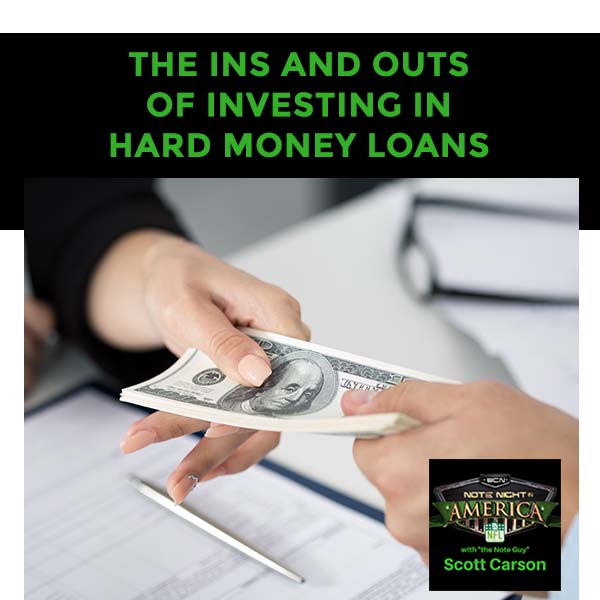
Do you want to learn about investing in hard money loans? On this episode of Note Night in America, Scott Carson breaks down what that looks like. He explains what a hard money loan is about, who and what it is used for, and some of the risks involved. Scott also shares an investment opportunity for those who might be interested in investing in hard money loans for a short period. Grab something and take notes as Scott dives deep into this conversation!
—
Watch the episode here
Listen to the podcast here
The Ins And Outs Of Investing In Hard Money Loans
Our topic is why you’re all here, obviously. It’s why you registered for the call. You want to learn about investing in hard money loans. Some of you are familiar with what a hard money loan is. Some of you are like, “I’ve heard of it, but I’ve never done it. I’ve never been a part of it.” I get it. Some people think it’s one thing. Other people think it’s another. “Isn’t hard money all types of loans that aren’t credit-based? How do I qualify for a hard money loan?” I’m not going to sit here and teach you. You can’t learn everything about hard money loans in an hour, but I will give you an overview and talk about a couple of opportunities that have popped up that we want to roll out and make an opportunity for you guys here if you’re interested.
It’s no biggie. It’s not a big deal, but we’ve had something come across our plate. I’ll get to that in a few minutes. First and foremost, if you’re familiar with hard money loans, hard money loans have been around for a long time. Some people think of hard money loans as like your cousin Guido, the shark loan sharking because they’re higher interest rates, and a guy shows up with a bag of cash. That’s not how it happens. I’m a previous mortgage broker. I’ve also been a hard money lender in the past. I did quite a bit of hard money lending with investors here in Austin, Texas back in 2007, 2008, 2009 and 2010.
What Is A Hard Money Loan?
I got into the note business and moved on from that. It was doing other things. A hard money loan is a note. It’s a loan. It’s written on paper like any other note, but there are some differences to it as well. Let’s first start out with what is a hard money loan. It’s a short-term loan designed for rehabbing real estate. Short-term, we’re talking twelve months or less. You’re buying. You’re doing fix and flips. You’re doing rehabs and some maintenance on stuff. It’s a short-term loan, 6 to 12 months. It’s usually based solely on the investment property and/or project. It’s based on the quality of that deal, and the specs of that deal, not based on your FICO scores or your credit scores.
Usually, a hard money loan will be somewhere between 60% and 70% of either the purchase price or the after-repair value. They call that ARV, After Repair Value. That’s the value of the property after you do repairs to it. It will vary by state and by lenders. Some lenders are going off to 70% of ARVs or going off to 70% of the purchase price where you’ve got to bring the 30% down rehab costs of yours. Every lender is a little bit different depending on the state. His foreclosure timeframes are a little bit different in each state. It’s usually about 70% of at least the purchase price. There are usually no prepayment penalties involved. If you need to go a little bit longer than twelve months, there’s usually an extension or a fee you can pay to extend.

Hard Money Loans: A hard money loan will be between 60% and 70% of the purchase price or the after-repair value.
It’s pretty easy. Almost every city in the country will have local hard money lenders. Every state has hard money lenders. It’s going to vary on that state’s specific foreclosure timeframes and what’s going on in the market. Primarily a hard money lender is going to be a first-lien investor. They’re going to put a lien on the property. You can use it to acquire the property. I have some friends in California and Arizona who are hard money lenders, but they’re doing second liens because there’s a first lien in place. There’s so much value above and beyond that they’re leaving the first lien in place because it’s traditionally financed. They’re bringing in money on a second lien position up to 60%, 70% over the repairs that are needed to that property.
When you’re at 70%, it may include the purchase price plus repairs. You’re going to have to get your repair scheduled easily approved. The hard money lender is going to review the project and see what kind of work it needs. They’re used to doing budgets all the time for repair. This is a great thing. In the past, a lot of times we got the properties that we would buy, got them pre-approved, especially on the REO side. We bought a note and took it back. We automatically get that asset if it needs a lot of work pre-approved with several hard money lenders. They would market the deal to their database. Sometimes, that 70% loan may include repair costs. If there’s enough equity and you’re buying it cheap enough, it may include the amount for that. They’re not just going to give you the money. They’re usually going to do it in a draw period. It means if you’re buying the property for $100,000 and you have a $30,000 repair budget, they’ll hold them on that $30,000 budget and release it in draws as work is completed or work is finished, and they inspect it.
It’s an interest-only loan. It’s not the principal interest. The interest rate on these can be anywhere from 10% to 15%. It is as low as 8% and as high as 18%. Middle of the road, it’s somewhere between 10% to 15% interest rate. There’s usually going to be an origination fee of some sort of anywhere from 1 to 4, maybe 5 sometimes. I’ve seen 1 to 5 points to the hard money lender, which is separate from the interest rate they charge. They’re getting points plus interest.
The rates and the percentage may vary by lender and experience. Also, if you’ve done multiple loans with them, they may cut you back on. They’re charging 3 points. “We’re going to charge at 1 point. At 15%, we’re only going to do 12,” or “Instead of 12, we’re going to do 10 because you do such a great job.” If you’re brand new, you’re probably going to pay somewhere between 12 and 4. A hard money lender quotes rates. It’s 10% and 3. It means 10% interest plus 3 points. If it’s 6 months, it may be a 2-point charge to extend it beyond 6 months and beyond 12 months.
What we mean by point in the mortgage industry, 1 point is equal to 1% of the loan. If it’s a $100,000 loan and they’re charging 3 points, that’s 3% of $100,000. It means $3,000. That’s one of the ways why hard money lenders like short-term loans. They like this six-month process because if they’re originating a new loan every six months, they’re making these points every six months instead of every twelve months. It puts a lot more money in their pocket.
What Is Not A Hard Money Loan
Let’s talk about what a hard money loan is used for or what it’s not used for. You would never get a hard money lender and have them be in long-term financing a home. It’s not like a Bank of America low-interest rate or even a subprime loan. An all-day loan would be a lot more advantageous than having a hard money lender on there at 10% to 12%. We all agree with that. You would not have long-term finance with a hard money lender.

Hard Money Loans: You would never get a hard money lender and have them be in long-term financing a home.
Anything beyond twelve months does not make sense because it’s going to eat up a lot of your profits in interest. You’re never going to have it on a primary owner-occupied home. If buy a new house to move into and you’re going to do rehabs in the first year, they’re not going to give you a loan on a primary owner-occupied. They don’t want you to drag out the foreclosure and file bankruptcy in case you don’t pay. Most hard money lenders will never do it on an owner-occupied home. That doesn’t mean some people move into that house when it was supposed to be an investment property. We’ve had that happen before. You go to foreclosure because it’s not what it’s for. Primary owner-occupied homes are not what hard money lenders look for. They’re looking for true investment homes.
Here’s another thing. You wouldn’t use a hard money lender on a skinny deal. The skinny deal is where it’s at 70%. That’s what your purchase price where you leave no repair costs. Unless you have the funds, have your own money on the side, your own lines of credit or stuff like that to repair the cost, you might have to go up to get a hard money lender and do that and do a skinny deal if you have the funds or it’s something simple that you can finance. I’m not a big fan of doing a skinny deal, to begin with. You are always going to leave plenty of meat on the bone.
Just because a hard money lender will lend you the money doesn’t always mean you should take full advantage of the full loan amount. Sometimes it works in your favor. A lot of times, you don’t want to be over-financed. You cannot use a hard money lender to buy notes. They want to own real estate. They want to be in a first-lien position. They don’t want to be on a 30-year mortgage. They want to be on a 1-year mortgage. You’re not going to use a hard lender to buy notes. That doesn’t mean a hard money lender like a principal won’t buy notes for themself.
I’ve got several friends that run hard money funds. They will buy notes or they will land money on a side business or their own personal funds into notes, but they won’t use the hard money funds to buy notes. They’re not going to do that because they’re missing out on those points every couple of months. They’re not going to do it. If you’re an owner occupancy, and we’re seeing at a 3% default rate or something like that, you can’t use a hard money loan to go bail out your property or bail your ass out if you’re in default because it’s owner-occupied.
If you’re the investor and you have a friend who’s in trouble, you could go get a hard money loan to buy their house to avoid them going into foreclosure. We’ve seen that happen many a time where hard money lender is financing because they’re buying a distressed asset at a discount and helping a friend out. The friend is no longer the property owner because it’s no longer owner-occupied. A hard money lender is always going to be to an entity person, not usually to a person. Here’s the thing, in long foreclosure states, it’s going to be much more expensive because there are going to be usually some more carrying costs.
I would not recommend doing a hard money loan in a long foreclosure state. In New York and New Jersey, I won’t do that. Anything over twelve months, I would avoid. You’re going to have a harder time in those states. Hard money lenders are throwing money at short foreclosure timeframes. The non-judicial states like Texas, Georgia, Missouri, North Carolina, Arizona and Nevada.
I had several people reach out to me. They’ve got money for hard money loans in California and Nevada all day long because the values keep going up. It was at 70% of value six months ago. It’s probably at 55% now with the way appreciation is going. I would not recommend doing a hard money loan in a long foreclosure state. A hard money lender is not probably going to finance a person. They finance it to an entity. It’s usually an LLC or maybe a trust. If it’s an LLC, it’s a non-owner-occupied loan that they can foreclose on that LLC. It may also see them do a deed loan or stuff like that.

Hard Money Loans: I would not recommend doing a hard money loan in a long foreclosure state.
Florida takes way too long. Florida has gotten a lot better than it used to be. We have a note where the bar did take out a hard money loan. We bought the hard money loan and they’ve dragged it out trying to drag things out. We’re excited that in the next few weeks, we should be finishing up with a deal. New York can take you three years to foreclose. That’s why a hard money lender is not going to want to be tied up into a New York deal without some other things like a deed in lieu and escrow or something like that.
How Hard Money Lenders Work
Let’s talk about how hard money lenders work. We’ve talked a little about this, but I want to outline it for you, guys. Hard money lenders work and here’s what they do. They’re going out. They’re not necessarily using their own funds. They might be, but they’re usually going out like many of you guys, going out and raising capital. They’re giving investors 6% to 8% of their money because that money is sitting on the sidelines, not doing anything. They’re going out and raising it and having them tied up for 12 to 24 to 36 months. Chuck, you’re right, Maryland is a long foreclosure state. Yes, it is.
They’re going out and finding people like you and me. They’re marketing for IRA investors. They’re marketing to local REIAs. They’re going out speaking at meetup groups. They’re looking for people who have lazy assets to the sideline, not doing anything. They’re glad to give them 6% to 8% on their money for a 12, 24 and 36-month timeframe. What they’ll do is they’ll usually turn around and lend that money out to investors, fix and flippers, rehabbers, and property investors, at a cap of 70% of either ARV, After Repair Value, or fair market value. They’ll lend that money out initially at an interest rate of 12% to 15%. I know we’ve briefly talked about this. It may be a little bit less, 11% or 10%. Usually, it’s double digits though.
You got to be careful. Some states have usury laws where if you go too high in the interest rate, it’s not good. You can get charged with usury and you don’t want to be that where you are loan sharking. You don’t want to do that. It’s a little bit more of a riskier loan because you’re not basing off on FICO scores and there’s also some rehab. There are some things that mitigate the risk. We’ll get that in a second. They’re going to charge you 1 to 4 origination points that you have to pay not to closing. They’re not usually going to roll that in. They’re usually going to make you pay that at closing, so you got to bring the points. Sometimes, they’ll roll it in if you’ve got enough room in the loan where you borrow on that loan, but I wouldn’t necessarily finance the points.
If you need to go for twelve months and it’s delayed because the market is taking longer or everything that happened with COVID, most hard money lenders that I know will charge somewhere around 2 points for extending the loan beyond twelve months. They’ll give you a 6 months extension for 2 points. They may hold back rehab costs as draws. They’re not going to give you the whole bottom money because some people will take the whole amount of money and run. They’re going to take off with the cash. Unfortunately, not all contractors are trustworthy. Sometimes we’ve seen GCs take the full draw, pull that money out, and run to Mexico.
They’re going to release that to you. As you finish your rehab on a bathroom, they’re going to release the $10,000 that you need for that, the $25,000 to complete the kitchen. You’re usually financing maybe a little bit on credit cards or your own money, and then getting repaid back or working that. There are different ways to do it. Someone will release the full amount to someone, depending on what’s going on with the project, how comfortable they are with you as a lender and your experience.
They may have it in those longer foreclosure states. If it’s going to be longer than a twelve-month foreclosure period, go ahead and sign a Deed In Lieu. That’s what DIL stands for. They’ll have you sign that and hold that in escrow with an attorney. In case you ever do get 90 days or more behind, instead of going through the foreclosure process in a longer state like Maryland, New York or New Jersey, they may go ahead and file that deed in lieu. They will let you walk away from the loan, and they’ll take the property over. It’s a friendly foreclosure.
One thing about hard money lenders is they have to understand the rehab projects. If you’ve got money sitting on the sidelines, you wouldn’t want to lend money out unless you understand the process or you had a third party helping you manage the project or you’re investing with somebody who understands what’s going on in the markets. That’s one of the things about hard money lenders. This is what they do. They understand rehab and days of market. Maybe they have a realtor and they can pull this information. They work closely with title companies. They know what’s going on in the market. They’ve got their pulse on the trends of the market, ups or down, days of market, what’s going on, and all that good stuff.

Hard Money Loans: If you’ve got money sitting on the sidelines, you wouldn’t want to lend money out unless you understand the process, have a third party helping you manage the project, or are investing with somebody who understands what’s going on in the markets.
They understand rehab. They’re not afraid to take a project back and finish it up because they’re at 65% to 70%. They’re at great LTV. Many times, if you did a hard money loan, you’ve done most of the rehab. It’s dragging stuff out, getting it listed, getting it sold, and maybe putting you in default. In April 2021, when the first foreclosure started taking place, specifically here in Harris County in Texas, there were 400 to 500 foreclosures. A mass majority of them were hard money loans and LLCs that were not owner-occupied homes. The lenders had finally said, “Enough is enough. We’re going to foreclose because we got to take the property back.”
Here’s the thing about hard money lenders. You will have some that lend all across the country. You can always go to REIClub.com. Look for information on hard money lenders. They’ll tell you what they lend. What they usually do is they have a local rep who understands the market, goes out and does that. They’ve got little offices that they lend across the country. They may be a little bit more competitive and ranked because they have more bulk, but they may not understand exactly what’s going on.
If I’m going to do something, I always want to work with somebody who knows that one market or two markets. Here in Texas, you got Jet Financial out of Houston and Longhorn Investments out of Dallas. They lend in Texas and the major metroplexes in Texas like Houston, Dallas, Fort Worth, Austin, and San Antonio. Some will go down to Corpus. It varies. There’s a lot of money in the market. He’s probably been getting hit up, “I’ve got money for sale, anywhere from $5,000 to $5 million.” That’s not the case. Hard money lenders don’t want to do a loan for $5,000. It’s not worth it. They want something probably usually at least $50,000 or $100,000 minimum so that’s worth their time in going out and reviewing the escrow.
What they’re going to do is often, the hard money lenders are going to send somebody out and watch the project. They’re going to drive by the house once every two weeks to see what’s going on. They’re going to ask you, “What’s going on with this project?” Let’s go through some numbers here. Some folks are more numerically based and they want to see the numbers behind a deal. That’s what I thought. I thought we’d throw together a sample deal, who’s paying what, and what’s going through from there.
You got a rehabber who has been lucky enough to find a property. It’s worth $200,000. It’s a light rehab. We’re not getting heavy on rehab. We’ll say it’s $200,000 fair market value right now. Light rehab, paint, carpet, the borrower wants to walk away and needs a cleanup. They’re lucky they’re going to buy the home that they got for $0.60 on the dollar, and they found a hard money lender, we’ll say SAC Investments, who will give them up the 70%.
They’ll give them $120,000 to close on the property and they’ll also have $20,000 sitting on the sidelines for the rehab budget. $140,000, 70% fair market value. Most of these hard money lenders will have an online platform to go through and put the numbers and the address so they can pull the numbers and spit out a pre-approval letter for you. The great thing is hard money lenders are not FICO-based. They don’t give a rats ass about what your credit score is. You could have an 800 credit score and you’re probably going to get it as somebody who’s got a 520 FICO.
More and more, they are starting to look at FICO scores. If you’ve got experience, that will heavily outweigh a FICO. If they go a little bit higher, you’re going to go above 70%, they’re going to want you to have a 630, 660 or 680 FICO score in some cases. It all depends on what that money costs. Turn around. If this guy goes to a hard money lender, the hard money lender then turns around and said, “We got this pre-approval for $140,000. Let’s call John. I know he’s got $150,000 sitting on the sidelines.”
John and I have an agreement in place that I’ll borrow the $140,000 from him at 6% for 12 months because John’s money is making zero. It’s sitting in an account waiting for somebody to put it to use. John is too busy at his job or he is too scared to pull the trigger to do it or he’s scared because he’s losing 7% to 8% in inflation every month, which is happening right now. For John to make 6%, it’s like his money is making 14%. With inflation added on, that’s 6%.
John is happy. He gets 6%. The hard money lender is going to pay him on a monthly basis or quarterly basis, depending on the agreement. It’s pretty good. He’s making his 6% on $140,000. The hard money lender then turns around and lends $140,000 out to the rehabber at 12 plus 3. That’s 12% interest plus 3 points at closing for 12 months. It’s a one-year loan to the rehabber’s LLC. The rehabber will pay the 3 points at closing, which is $140,000 times 0.03. It’s $4,200. The rehabber is bringing $4,200 to the closing table. If he’s only going to fund $120,000 and they would approve the $140,000 project, he might be able to roll that in, and then the hard money lender gets that $4,200 to the closing table.
Let’s say for sake of it, you got to bring the 3 points to the table because they want to see you bring a little bit of something. The rehabber or fix and flipper is going to be paying $1,400 on a monthly payment to the hard money lender, due by the 5th of every month. Payment dates all depend on when you close and stuff like that. Usually, they want you to pay within 45 days of closing, which is great because a lot of times you may be able to have a house maybe almost all the way done and completed, especially on an easy cleanout, that you’re able to list it, and you’ve only paid your first month. You also got to have the insurance and taxes paid.
In turn, the rehabber is paying the hard money lender $1,400 a month. The hard money lender is turning around and paying his investor 6% or $700 a month. The hard money lender is making some money in the spread. The rehabber is happy because he’s got financing. The investor who has $140,000, to begin with, is happy making his 6%. The hard money lender in total is making $700 a month in that arbitrage between what he’s paying the investor and what their fix and flipper is paying, plus the points. He’s getting 3 points on this loan. That’s $4,200 in point fees. In a year timeframe, you take $4,200 plus $700 times 12 is $8,400. On this one loan, the hard money lender made $12,600 in profits if it took a full year.
If it only took six months, he’d be making $10,000, but he still gets the $4,200 in points no matter what. There are usually no prepayment penalties on a hard money loan. That’s why a lot of hard money lenders like this because if I can do a loan every six months, I’m making a nice chunk of change. This one lender, I can make $8,400 off of it if I can do it in six months versus once. That’s why they like working with rehabbers that are experienced. They know that the project is 90 days to get done and 90 days to sell. They can rinse and repeat that money that’s willing to give them a little bit less rate on interest rate, but they may still keep the points on that.
Let’s talk about what the rehabber makes. The rehabber borrowed $140,000 for 12 months at 12%, plus 3 points. One year in interest is $16,800. That’s 140 times 12, plus the 4,200 in points. This loan cost him $20,000 to get done, but he didn’t have to jump through any hoops. He sells the home for $200,000 minus the $140,000 in the purchase price, plus repairs, plus the $20,000 in money cost. That’s why it’s $40,000 in profit to them. I know a lot of rehabbers will do a hard money loan deal if they can make $15,000 or $20,000 on a deal. That gets to be skinny. I don’t want to see anything less than $25,000 for the most part, but $40,000 is not a bad day. That’s pretty good. If you did one of those a year, $40,000 a year is not bad.
The idea here is if he could do it in six months, his interest costs would be reduced to $8,400 versus $16,000, and he’d end up making about $7,000 more.
Here’s the thing, the rehabber didn’t need to qualify his FICO score, his payment history, his job experience, and his reserves. He didn’t have to jump through any of the flaming hoops that the banks make people jump through these days. It’s going to get worse out there as credit tightens up. The hard money lender most of the time doesn’t give a rat’s ass about FICO or your experience. It’s all about the project. The more experience you have, the better rate you will often get on a loan. The first time you’re doing it with somebody, you’re probably going to pay the full 12 plus 4. That’s going to get better as good as you are, and going through.

Hard Money Loans: Most of the time, the hard money lender doesn’t give a rat about FICO or your experience. It’s all about the project.
More so than anything else, the hard money lender is going to care about the property and the project. You’re talking about what it needs and what you’re putting into it. Does that make sense that you’re going to be able to sell this property quickly at $0.90 to $0.95 on the dollar or maybe even more, depending on what crazy market it’s in? Hard money lenders are making money on the difference and/or the arbitrage between what they’re paying their underlying investors and what they’re charging the fix and flippers. They’re making money on the point each time they make the loan.
That’s how hard money lenders work. There are hard money lenders out there all over the place. There are a lot of them out there all over the place. Depending on what state you’re in and stuff like that, there will be different rates out there. There are some risks. This is something that you have to keep in mind. People always ask me, “Scott, this sounds pretty decent. What are the risks to the hard money lender and to me as the private investor?” Here’s the risk. What if the rehabber doesn’t complete the rehab? You foreclose, take a deed in lieu, turn around and sell it at 70% to another fix and flipper, or you finish the project and sell it yourself. That’s the nice thing about that.
Most hard money lenders know the subcontractors. They have a team of people already in place to step in and do that stuff because most of them are also fix and flippers. They’re also buying out real estate themselves. If they’re making hard money loans, they know plenty of other fix and flippers that they can sell the asset to, take it off their hands, and go from there. That’s the great thing. The rehabber demos too much. We’ve had this happen before. We wholesale the property to a guy. His crew went in there, ripped the roof off, and ripped off these old hardwood floors. He did too much rehab.
That happens when somebody is not experienced, you don’t have the actual project, and the hard money lender is reviewing the rehab and the work. These days, you always want to have somebody who understands the rehab, “What are you doing? Tell me exactly what you’re doing. Let’s communicate that specifically to your crew.” In some places like San Diego, they’ll rip down everything except one wall. One wall standing in rehab is not considered new construction. They get away with that.
A deed in lieu is legal everywhere as long as it’s signed on. It’s completely legal in New York. What if the rehabber doesn’t pay? You foreclose. Take the asset back and sell it off as is or fix and rehab. If the rehabber moves into the house, that’s a violation of the loan agreements. You foreclose, take the house back, and sell it all off. Here’s a great thing too. Hard money lenders are often servicing the loans. They’re collecting the payment. Since it’s an entity loan and it’s not an owner-occupied loan, it doesn’t have all the hoops that you jump through for Dodd-Frank. It’s an entity loan. You have the ability to do a deed in lieu of escrow. You can foreclose.
You still want to have it serviced with servicing where the money comes in, is collected, and make sure everything is paid off. Taxes and insurance are maybe escrowed in there. When they’re buying the property, if there’s $3,000 in back taxes owed when they’re doing the loan, they’re going to want to make sure those back taxes are paid at the closing table. It’s the same thing with making sure there’s insurance in case of an accident on the job site or a tornado comes through or whatever. They’re going to make sure that there’s insurance required at the closing on the asset, and the hard money lender is made payable.
Are there any questions about that stuff so far? Does it make sense so far what I’ve talked about? We’re not done yet. I just want to give you a bit of a rundown of what hard money lending is and what a lot of things go through. There will be maybe some changes in one state versus another. Some lenders want to see a decent FICO. Some of them want to see experience. Some of them don’t want to see the experience. What happens when a homeowner signs a deed in lieu and then later files for bankruptcy? If the deed in lieu is recorded, it’s done. I don’t think they’re necessarily going to file bankruptcy. You then go to bankruptcy court and you say, “They’ve signed this over in this case.” You get the bankruptcy discharged. That is what I would imagine will happen.
There have been sillier cases where it’s dragged out. Here’s the thing. If a rehabber is struggling with a project, they’d probably be glad to sign the deed in lieu. Here’s the thing, it’s not affecting their personal credit. A bankruptcy is going to affect their credit. A late payment on an entity isn’t going to affect its credit. Most of the time, the hard money lenders are not reporting to the credit bureaus. Most of the time, if you got a project and it’s not going well and you need to deed it over, most of the hard money lenders are like, “Give it to us. We’ll run with it, get it fixed, and be done with it. No hard feelings. You are probably not going to be able to do a loan with us anymore. You got to go somewhere else.”
Opportunities At We Close Notes
The more communication happens, the better it’s going to be. This is why hard money lenders are also going out and inspecting properties. They’re making sure that the work has been done before they release the work and make sure they release it to the right person. We’ll move on here. What’s great is at We Close Notes, we get all sorts of different opportunities. I get phone calls all the time. I had three people reach out to me via email or phone and say, “I’ve got a note for sale. I’ve got a note available and we’re reviewing stuff. One is in Kansas City. One is in Salt Lake City.” I had an interesting conversation. I had a friend. When you market as much as we do, which you all should be marketing, we get people all time that refer people to us.

Hard Money Loans: The more communication happens, the better it’s going to be.
Jim, I don’t know, but if a borrower signs a deed in lieu over and then files bankruptcy, I’m sure you can present it and get a discharge. A homeowner is different from an investor. I’m sure you can be able to get the discharge. Your attorney has got to get it kicked out there. That’s a legal question. I am not an attorney or an accountant. We had this opportunity pop up. I thought it enough that I said, “Let me run this because I think there are some opportunities.” We’ve been looking for it and that fell in our lap. It’s interesting when you put out there what you’re looking for, you talk about it, and you share it, things happened. It’s all the quantum physics and karma. Good things happen to those that tap their market.

Hard Money Loans: Good things happen to those that are in that market.
We had this opportunity. We had a hard money lender reached out to us and they’ve got $20 million in performing hard money loans. They’re active in their market and they’re looking for somebody to come in and buy their performing loans, not at a premium. I’ve had hard money lenders that are like, “We want to sell it at a 10% yield.” They’re willing to sell these performing loans because they need the $20 million. They’ve got their own funds to put back into a market and recycle their money. They have the ability. They said, “We got the ability to put $40 million in the market. Right now, we have $20 million roughly in our own money in the market. We need to recycle those loans and find somebody that can come in and buy a loan after we receive the first payment. We’re servicing them. We’ve approved the projects. We’ve reviewed the projects. We’ve done it. We’re big fix and flippers in the market as well.”
They’ve got loans anywhere from small like $30,000 up to a $500,000 property. They’re only doing first liens. They do have some seconds, but I was like, “If we are interested in this, we’re not going to buy any of the second liens. We’re only going to buy first liens that are up to 70% of the fair market value or lesser. If you’ve got a loan for 55% of fair market value, that’s what we’ll fund. We’ll go and buy that note at par and take over the payment stream on it.” These are short-term loans. They’re hard money loans, 6 to 12 months, and they’re all at 12% interest.
There’s a little bit more, but for the mass majority, it’s a 12-month loan at 12% interest. That’s pretty good. They’re usually at 70% of fair market value. If they have a few more that are above 10%, we’re not talking about this. We wouldn’t be buying this. We would make sure that we’re at 70% of fair market value, as-is value, and not ARV when we’re looking for finished projects. They’re going to drag it on for maybe a 3-month, 6-month, 9-month or 12-month process. They’ve got borrowers from one deal all the way up to those that have done 32 deals.
They sent us their full portfolio of what they’re looking to move, 154-plus loans. I started talking, “Here are some things. We would only want first liens. I see most of these are first liens. We would only do this up to 70% of the fair market value. We wouldn’t go over that.” We want them to at least make one payment because they’re servicing these loans too. They’re self-servicing these loans because they know the borrowers, they work with the borrowers on a regular basis, and they’re servicing. They know immediately if the payment has been made or is late. They know and send somebody out directly. They buy and fix and flip a lot in this market as well. I’ve seen their portfolio. They got some great things going.
It’s in the St. Louis market in the Southern Illinois area. It’s not Chicago, not Crook County, but on the St. Louis market. Just to give you a bit of an idea, this is the 154 loans I’m after. There are a few outsiders that didn’t make the map here, but it gives you a bit of a map. You see, they know what’s going on in the market. They know the days on market, the repairs, and a variety of things that are going on the average days on the market, repair costs, and things like that.
They know what’s going on in the market because they’ve been doing it for a while. I pulled 4 or 5 quick little photos off the 150. That’s one of the smaller loans. That was a $50,000 hard money loan they had. They repaired it. This was one of their deals. It’s pretty nice. The interior photos were all rehabbed. The picture is nice. This is another one that they’ve done. They’ve also got some folks that are going in and doing some duplexes and multifamily stuff in St. Louis. Some of them are in good areas, others are in rougher areas, but they’re buying them at great value and they’re putting a lot of work in. You see a lot of renovations going on. Obviously, the price value is going up on affordable homes.
That’s just a snapshot of a few of the ones that we pulled online. If you got money sitting on the sidelines and this interests you, here’s an opportunity to put your money to work. An opportunity for you to come in and invest in short-term loans, 6 to 12 months, in St. Louis or Southern Illinois market. We’d be paying a 6% interest rate on a monthly basis. If it’s 12%, you’re getting half, you’re getting 6%. Our handling of the loans is getting the other half. We’d be buying these at par. We’re not doing newly originated before it. This would require at least one monthly payment made.
First liens only, no greater than 70% LTV. Loans need to be serviced by a lender. Here’s a kicker. This is the big thing that I asked for and they said yes to it. If the borrower stops paying, say it’s a 12-month loan, the borrower stops paying after four months, we paid $100,000 for the $100,000 note, and they will buy back the loan at 100% of the purchase price. At what we paid for, they would buy it back. No questions asked because they are fix and flippers. They don’t mind taking the project over and paying it back to us because they want us to keep giving them money for the good hard money loans that are performing. That’s a huge thing that you don’t see every day.
They’re not all across the country. They’re in those St. Louis markets and a few of the outliers there for you. We would review the projects. We’d fly up and take a look at the assets. I already started doing some due diligence on them, checking in, walking, looking at the collateral, looking at the servicing docs, walking the assets without them knowing it, going up there early and doing that. That’s one of the things that we’re doing. We’ve got some opportunity here. They’re willing to sell these notes. They’re making 12%.
If you want to put your money to work, it’s making 0% or not making 6%, we can put it to work for a short period of time. Either put it in an LLC or have you pay our 6% out of the proceeds as well if you’re interested in doing that. We would review those things. We’d make it pretty easy for you to get your money. There’s no prepayment penalty. There’s nothing to brag about these things out. If the borrower didn’t pay on time, they’d buy the loan back from us. If it drags that a little bit longer, we could do the renewal for them and keep making the interest rate on it. That’s what we’re looking for. Your investment would be returned at close. If you put $100,000 in, it was 12 months, the property sold, and you’ll get your money wired back directly to you. That agreement ends. If you wanted to roll in another one, we could do it another one for you.
If you are interested, feel free to drop me an email at Scott@WeCloseNotes.com. We’re going to review everything. I’ve already started reviewing loan files on a few of the assets, and send me a couple of sample loan files so we can see and dive into them. Follow me at TalkWithScottCarson.com and jump on the calendar and talk about this deal. I’m not going to tell you who the hard money lender is. I don’t want you going around my back, but the whole point is that if you’ve got somebody to burn a hole and you want to put in short-term stuff, this is an opportunity to put it in, make a decent return, keep up, and exceed inflation there for you so that your money is making something instead of sitting there and losing buying value on a regular basis.
It may pay off sooner. You may get your money back sooner than twelve months. Some may drag on a little bit longer. I don’t know. We’re very strict. Nothing beyond 70%. They got to make at least one monthly payment on the road. There’s a clause for them to buy back that loan in the loan sale agreement if something goes astray with the borrowers up there. You can use your self-directed IRA funds. Everything is approved by our attorneys to help you fund that and put those through. We’re going to be looking for at least $50,000 minimum per investor. No, this is not something for you to go out and find a friend and I’m going to broker his money. It’s your own money to invest.
Unless you’ve got investors that want to make less than 6%, that’s fine. We’ll carve that stuff out for you. If you’re interested, please drop me an email at Scott@WeCloseNotes.com. Please say, “Hard money loans.” I’ll be glad. They’ve got loans for $50,000 up to $500,000. If you’ve got a chunk of change and want to put the work in the short term, here’s the opportunity for you. Also, I’m not opposed to bumping that interest rate up a little bit to 1% if you’re doing multiple deals with us as well. Everything will be disclosed. You’ll have full access to see everything, collateral, files and property once we end up funding the deal, and get ready to rock and roll there for you.
We are looking to close our first batch of these. That’s why we bumped this up into the conversation as I talked with them. I wanted to see your interest before we roll this all out across our marketing. We’d be glad to talk with you one on one about the deal and go through a few of the things. We get enough interest off this call. Another thing we’re going to do, I’ll jump on a plane and be flying to St. Louis to review their process, systems, and stuff like that to make sure it’s not you guys with a spreadsheet.
There you go, everybody. Thank you for joining me here. If this interests you at all, please drop me an email. Let me know. I get it. “I got my money typing a project, but it may be out next 30 or 60 days,” That’s fine. Let me know. This should be an ongoing project for at least the next 12, 24 or 36 months if we do it right. Thanks for swinging by. Go out, have a great week, and we’ll see you all at the top.
Important Links
Want to talk to Scott? Book a call with him HERE
Love the show? Subscribe, rate, review, and share!

